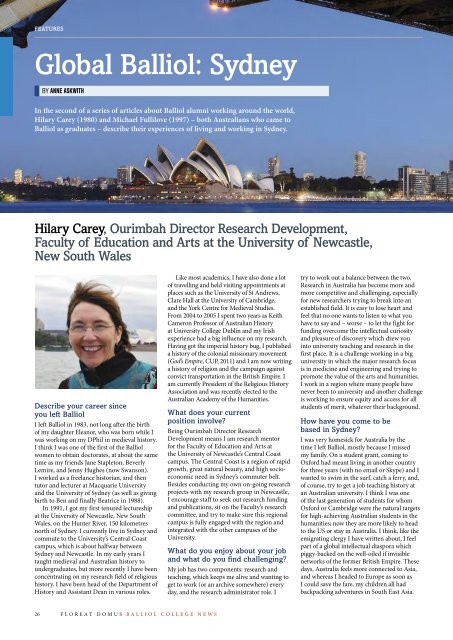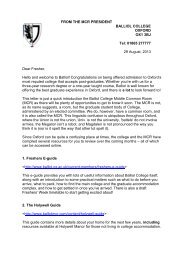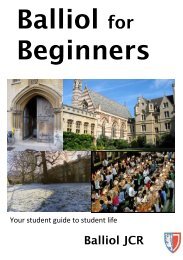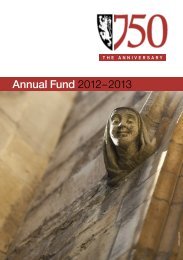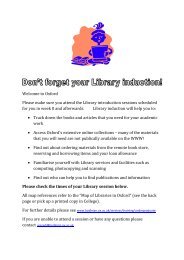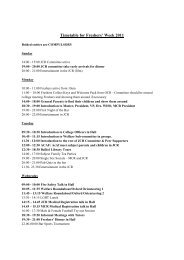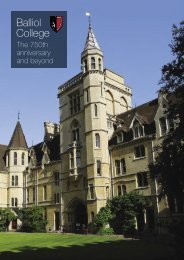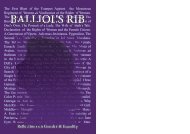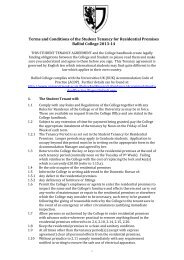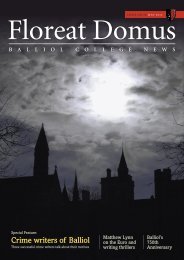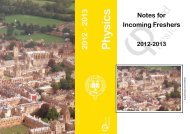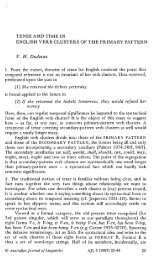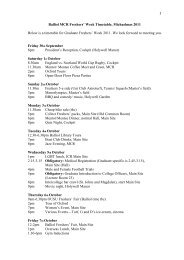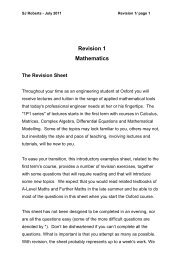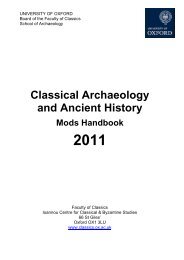Issue 19, 2013 - Balliol College - University of Oxford
Issue 19, 2013 - Balliol College - University of Oxford
Issue 19, 2013 - Balliol College - University of Oxford
You also want an ePaper? Increase the reach of your titles
YUMPU automatically turns print PDFs into web optimized ePapers that Google loves.
features<br />
Global <strong>Balliol</strong>: Sydney<br />
By Anne Askwith<br />
In the second <strong>of</strong> a series <strong>of</strong> articles about <strong>Balliol</strong> alumni working around the world,<br />
Hilary Carey (<strong>19</strong>80) and Michael Fullilove (<strong>19</strong>97) – both Australians who came to<br />
<strong>Balliol</strong> as graduates – describe their experiences <strong>of</strong> living and working in Sydney.<br />
Hilary Carey, Ourimbah Director Research Development,<br />
Faculty <strong>of</strong> Education and Arts at the <strong>University</strong> <strong>of</strong> Newcastle,<br />
New South Wales<br />
Describe your career since<br />
you left <strong>Balliol</strong><br />
I left <strong>Balliol</strong> in <strong>19</strong>83, not long after the birth<br />
<strong>of</strong> my daughter Eleanor, who was born while I<br />
was working on my DPhil in medieval history.<br />
I think I was one <strong>of</strong> the first <strong>of</strong> the <strong>Balliol</strong><br />
women to obtain doctorates, at about the same<br />
time as my friends Jane Stapleton, Beverly<br />
Lemire, and Jenny Hughes (now Swanson).<br />
I worked as a freelance historian, and then<br />
tutor and lecturer at Macquarie <strong>University</strong><br />
and the <strong>University</strong> <strong>of</strong> Sydney (as well as giving<br />
birth to Ben and finally Beatrice in <strong>19</strong>88).<br />
In <strong>19</strong>91, I got my first tenured lectureship<br />
at the <strong>University</strong> <strong>of</strong> Newcastle, New South<br />
Wales, on the Hunter River, 150 kilometres<br />
north <strong>of</strong> Sydney. I currently live in Sydney and<br />
commute to the <strong>University</strong>’s Central Coast<br />
campus, which is about halfway between<br />
Sydney and Newcastle. In my early years I<br />
taught medieval and Australian history to<br />
undergraduates, but more recently I have been<br />
concentrating on my research field <strong>of</strong> religious<br />
history. I have been head <strong>of</strong> the Department <strong>of</strong><br />
History and Assistant Dean in various roles.<br />
Like most academics, I have also done a lot<br />
<strong>of</strong> travelling and held visiting appointments at<br />
places such as the <strong>University</strong> <strong>of</strong> St Andrews,<br />
Clare Hall at the <strong>University</strong> <strong>of</strong> Cambridge,<br />
and the York Centre for Medieval Studies.<br />
From 2004 to 2005 I spent two years as Keith<br />
Cameron Pr<strong>of</strong>essor <strong>of</strong> Australian History<br />
at <strong>University</strong> <strong>College</strong> Dublin and my Irish<br />
experience had a big influence on my research.<br />
Having got the imperial history bug, I published<br />
a history <strong>of</strong> the colonial missionary movement<br />
(God’s Empire, CUP, 2011) and I am now writing<br />
a history <strong>of</strong> religion and the campaign against<br />
convict transportation in the British Empire. I<br />
am currently President <strong>of</strong> the Religious History<br />
Association and was recently elected to the<br />
Australian Academy <strong>of</strong> the Humanities.<br />
What does your current<br />
position involve<br />
Being Ourimbah Director Research<br />
Development means I am research mentor<br />
for the Faculty <strong>of</strong> Education and Arts at<br />
the <strong>University</strong> <strong>of</strong> Newcastle’s Central Coast<br />
campus. The Central Coast is a region <strong>of</strong> rapid<br />
growth, great natural beauty, and high socioeconomic<br />
need in Sydney’s commuter belt.<br />
Besides conducting my own on-going research<br />
projects with my research group in Newcastle,<br />
I encourage staff to seek out research funding<br />
and publications, sit on the Faculty’s research<br />
committee, and try to make sure this regional<br />
campus is fully engaged with the region and<br />
integrated with the other campuses <strong>of</strong> the<br />
<strong>University</strong>.<br />
What do you enjoy about your job<br />
and what do you find challenging<br />
My job has two components: research and<br />
teaching, which keeps me alive and wanting to<br />
get to work (or an archive somewhere) every<br />
day, and the research administrator role. I<br />
try to work out a balance between the two.<br />
Research in Australia has become more and<br />
more competitive and challenging, especially<br />
for new researchers trying to break into an<br />
established field. It is easy to lose heart and<br />
feel that no one wants to listen to what you<br />
have to say and – worse – to let the fight for<br />
funding overcome the intellectual curiosity<br />
and pleasure <strong>of</strong> discovery which drew you<br />
into university teaching and research in the<br />
first place. It is a challenge working in a big<br />
university in which the major research focus<br />
is in medicine and engineering and trying to<br />
promote the value <strong>of</strong> the arts and humanities.<br />
I work in a region where many people have<br />
never been to university and another challenge<br />
is working to ensure equity and access for all<br />
students <strong>of</strong> merit, whatever their background.<br />
How have you come to be<br />
based in Sydney<br />
I was very homesick for Australia by the<br />
time I left <strong>Balliol</strong>, mostly because I missed<br />
my family. On a student grant, coming to<br />
<strong>Oxford</strong> had meant living in another country<br />
for three years (with no email or Skype) and I<br />
wanted to swim in the surf, catch a ferry, and,<br />
<strong>of</strong> course, try to get a job teaching history at<br />
an Australian university. I think I was one<br />
<strong>of</strong> the last generation <strong>of</strong> students for whom<br />
<strong>Oxford</strong> or Cambridge were the natural targets<br />
for high-achieving Australian students in the<br />
humanities; now they are more likely to head<br />
to the US or stay in Australia. I think, like the<br />
emigrating clergy I have written about, I feel<br />
part <strong>of</strong> a global intellectual diaspora which<br />
piggy-backed on the well-oiled if invisible<br />
networks <strong>of</strong> the former British Empire. These<br />
days, Australia feels more connected to Asia,<br />
and whereas I headed to Europe as soon as<br />
I could save the fare, my children all had<br />
backpacking adventures in South East Asia.<br />
26<br />
floreat domus balliol college news


